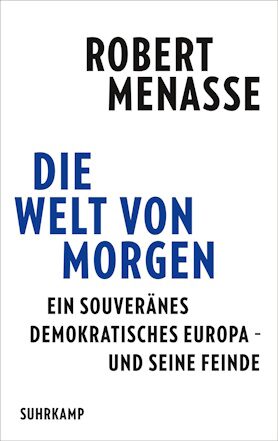Robert Menasse
Die Welt von morgen. Ein souveränes demokratisches Europa – und seine Feinde
[The World of Tomorrow. A Sovereign, Democratic Europe – And Its Enemies]
- Suhrkamp Verlag
- Berlin 2024
- ISBN 978-3-518-43165-8
- 192 Pages
- Publisher’s contact details
Saving Central Europe – Old Utopias in a New Guise
There is no denying it: the mood in Europe is anything but good. There is little sense left of the spirit of optimism that accompanied the postwar order and its political idealism of “Never again!” Indeed, the prospects are darkening for the dream of European solidarity, the grand project of a union of states that was eager to leave behind the specter of individual nations barricading, distancing and isolating themselves. “I’m not a clairvoyant, I can’t read the future” writes Robert Menasse in his latest book-length essay, “but to me the forecast looks grim.”
But Menasse wouldn’t be the polemicist he is, a darling of the German-Austrian public for decades now, if his gloom and doom weren’t partly tongue in cheek. Whatever the case, he’s written a book to once again explain to us the virtues of a supranational Europe. Why we should and indeed need to believe in a post-nation-state Europe. Why we should and need to banish dystopian thinking from our minds and hearts. And why we should be fearful – but fearful for the right reasons. How many times have we been told that we have to understand the fears of people who vote for misanthropic, rightwing populist parties. “This is scary to me,” writes an irate Robert Menasse. “Show me the politician who says: ‘We have to take the fears of Mr. Menasse seriously.’” Because his fears are well-founded, unlike the diffuse fears propagated on the fringes, whether migration, social decline, modernization or extreme weather events. Robert Menasse, the son of a Jewish professional soccer player from Vienna, understandably felt anxious when in 2020 he witnessed demonstrations of so-called “unconventional thinkers” at which neo-Nazis peacefully joined forces with people who apparently have no problem protesting alongside neo-Nazis in order to disparage democracy. In “The World of Tomorrow” he pleads for a better world. Because the world of tomorrow doesn’t need to look like this; it could just as well be cosmopolitan, philanthropic, proactively solution-oriented. It’s time, in other words, for old utopias in a new guise.
“There was once a time when, at least retrospectively, a larger political context was intrinsically understood as a single cultural sphere. The term was Central Europe, or Mitteleuropa.” Menasse is referring here to the term as it was used in the old Habsburg empire, in which a plurality of nations shared a large territory, a common market, a single currency, an administrative apparatus, one parliament, and a progressive model of recognizing national identity, not on the basis of territory but cultural affiliation. Just as religious communities absorb their members around the world in corresponding institutions, Mitteleuropa had the pragmatic notion of using the cultural sphere to satisfy its citizens’ need for a sense of belonging. “The system was first introduced in two of the Habsburg monarchy’s crown lands, in Moravia and Bukovina. In Galicia, where it had already been the de facto norm, it was scheduled to gain official legal status, until the outbreak of the war put an end to these plans.”
This Old Austrian constitutional state, a topic of much discussion in its day among leading experts in constitutional law, is still avant-garde today, writes Menasse. At the present, one can only “belong” to the EU by means of national citizenship in an EU country, and not through any kind of overarching “cultural sphere.” The eastward expansion of the EU, a process linked with great expectations, has only brought further nationalist furor in the post-Soviet era rather than a shared European spirit. And this, regardless of whether the issue was fighting the COVID-19 pandemic, debt, refugees, or the effects of global warming. Europe is far from having a unanimous political vision. National rivalry, fueled by the European Council, is blocking the democratic potential of the European Commission. Menasse considers this one of the biggest missed opportunities of the globalized twenty-first century.
“The World of Tomorrow” presents arguments for a postnational Europe in 38 chapters of varying length. Some of these are anecdotal, some informative, some aphoristic in nature. The author would like to know if his glass is half-full or half-empty. “What an irritating idiom! The real question is if there’s any possibility of refilling our glasses!”
With Menasse we certainly have our fill. He portrays the utopia of a community that defines itself in cultural terms without becoming reactionary, that doesn’t, in its obliviousness to history, sell off its recently won freedom to neoliberalism, and which doesn’t surrender its culture of remembrance to greedy cynics with no real visions. Like political scientist Ulrike Guérot, whom Menasse has collaborated with as an essayist, Menasse calls for us to remember the idealistic beginnings of the European project. “This would require, first of all, deleting ‘our values’ from the dictionary of phrases and making it a true principle of our political action, no matter if it sours our diplomatic ties with the United States or gives rise to trade issues with China […] Second, the idea of the European project needs to be reconstructed and consistently defended.” All of this sounds so easy. Reading this engaging book will make clear why it is nonetheless necessary to repeatedly emphasize this when it comes to envisioning the world of tomorrow.
Translated by David Burnett

By Katharina Teutsch
Katharina Teutsch is a journalist and critic. She writes for newspapers and magazines such as: the Frankfurter Allgemeine Zeitung, Tagesspiegel, die Zeit, PhilosophieMagazin and for Deutschlandradio Kultur.
Publisher's Summary
The manifesto of a passionate European
In The World of Yesterday, Stefan Zweig depicted the cosmopolitan Europe he had lived in prior to 1914. By the time he put his memories on paper, though, this world no longer existed, having been “washed away without a trace” by the barbarism of fascism. Zweig died in 1942. But after 1945, the notion of a supranational Europe was given a second chance. Visionaries initiated a historical peace project, borders were erased, and nationalism gave way to cooperation.
But this project might likewise soon be a thing of the past. Democratic deficits are provoking protest movements. Manifold crises have left the people worried about the future. And in many of the states of the EU, politicians – who have no interest in the experiences that influenced the founders of the Union – are looking to whip up new waves of nationalist fervour. Today, Europe stands at a crossroads. What will the world of tomorrow look like?
Robert Menasse explains and defends the idea of Europe, while also inviting readers to criticise and ultimately work to resolve the systematic contradictions of the EU. The alternative is not complicated: either we achieve something that has never before been achieved in history, namely the establishment of a post-national democracy, or we face the threat of regressing into a Europe of nation-states. That would represent yet another defeat for reason – with all the dangers and consequences that go along with that. Anybody familiar with history should be aware how devastating the effects could be.
(Text: Suhrkamp Verlag)
